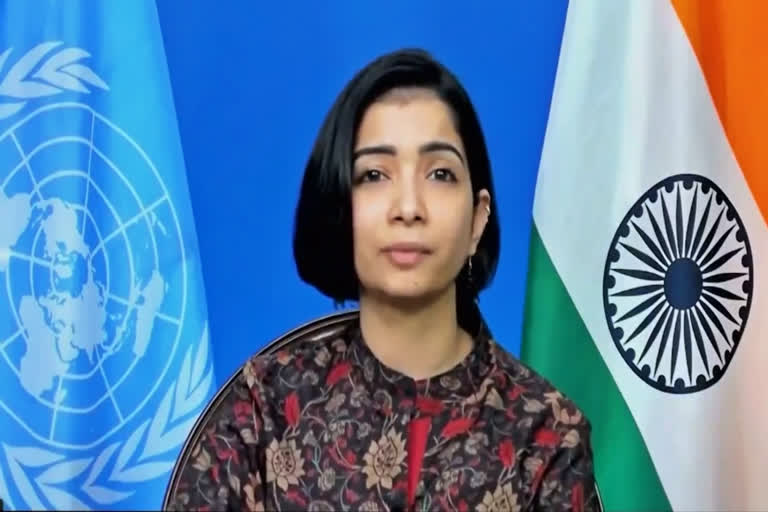New Delhi: India brought over 200 million Indian women into the mainstream financial system and thereby promoting economic empowerment, even during the pandemic, said Sneha Dubey India's first Secretary at the 76th session of the United Nations General Assembly.
Addressing a discussion on ICTs for sustainable development and globalisation and interdependence, at the UNGA second committee, the young diplomat said, "During the pandemic, India undertook unparalleled social protection initiatives that were pro-poor and broad-based in outreach. Digital technology and the energies of the internet have been a force multiplier in this endeavour.
A programme to supply free food to 800 million people and cash transfers to 400 million was streamlined by digitally-enabled technology, along with the delivery to 80 million households,"
"Financial inclusion has been accelerated and digital transactions have been stepped up, bringing over 200 million Indian women into the mainstream financial system and thereby ushering in economic empowerment,"
She said that for almost two years now, the world has continued to battle with the global pandemic, leading to this new normal, adding that "India has made efforts to adapt to this situation. Our shared experience of combating this crisis so far has shown that we are stronger when we work together,"
Also read: Who's Sneha Dubey? Her Spartan speech at UNGA makes her social media's new darling
She pointed out that UN General’s latest report under this agenda item reaffirms that science, technology and innovation for sustainable development have been critical in addressing Covid response and recovery.
"Our indigenous IT platform, Arogya-Setu facilitated effective Covid- contact tracing. India's Co-WIN App - an open platform for managing vaccination - continues to facilitate vaccines to millions. ICT tools have been deployed in an effective manner for improving access to quality education and healthcare services," Dubey said.
The diplomat said that India has thus created a strong, transparent and vibrant digital system that is inclusive and empowering, offers much-needed solutions for tackling poverty, promoting economic growth and improving productivity during Covid times.
"However, we cannot deny that technologies are also creating unprecedented challenges that include invasion of privacy, promotion of misinformation and disinformation, infiltration of critical infrastructure through cyber-attacks, a threat to human rights and accentuating the digital divide," she added.
Access to technology is not always uniform and this has led to widening disparities between the developed countries and the Global South. Keeping with the central premise of the Sustainable Development Goals of "leaving no one behind”, we believe the ongoing digital revolution must be inclusive, Dubey reiterated.
Sneha Dubey further underlined that the Covid-19 pandemic has deepened economic insecurity and inequalities. It has been devastating for countries that possess fewer capacities to respond; thus damaging prospects for achieving sustainable development targets.
"Globalization and interdependence have been given a greater urgency in the new context. Global challenges like terrorism and climate change that are putting the current global governance structures to test can also be more effectively addressed if we cooperate actively and purposefully," she explained at the UNGA.
Also read: Pakistan arming terrorists as a matter of State policy, India tells UN
She suggested that reinvigorated and reformed multilateralism is required to better reflect the realities of today. She emphasised the need to create greater global capacities so that pandemic-scale challenges are more effectively met.
Sneha highlighted that as India has moved to deal with the pandemic itself, it has also strived to extend support to other countries. "Whether it is medical assistance and humanitarian help to over 150 nations, or sharing our vaccine production delivery capacities with the world, we remain convinced that only a collaborative approach can succeed in tackling such complex global threats", added Dubey.
"Notably, India's initiatives such as the International Solar Alliance, the Coalition for Disaster Resilient Infrastructure and the establishment of the India-UN Development Partnership Fund are manifestations of our faith in collective action.
Therefore, India continues to play its part in contributing to growing efforts to meet sustainable development challenges, in keeping with the timeless Indian wisdom of seeing the world as one family," Dubey said.



